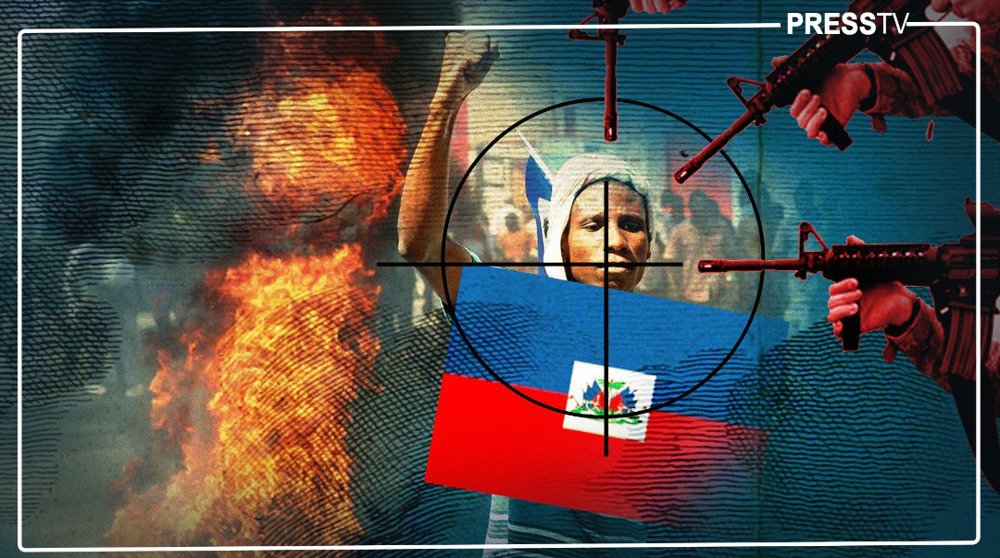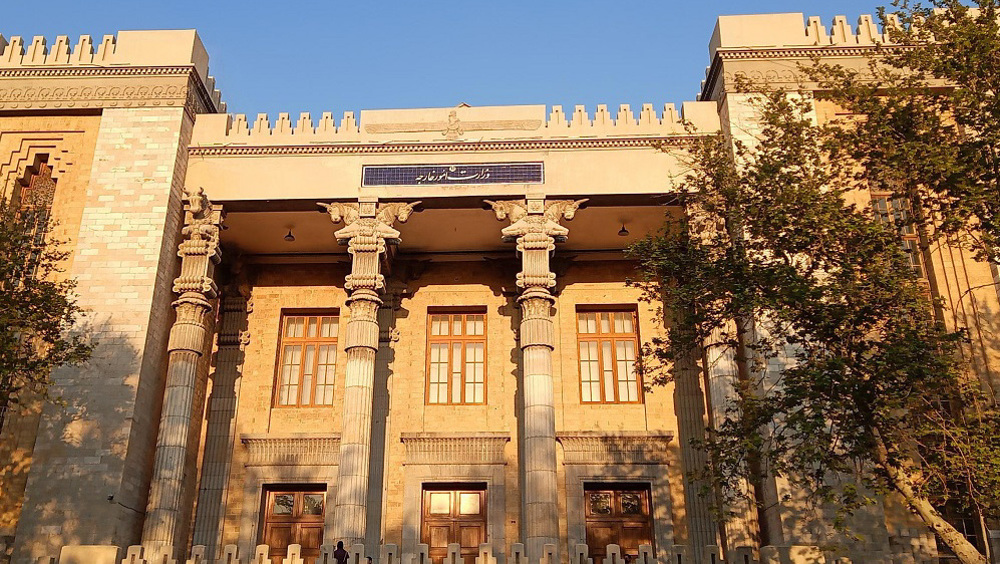Haiti, the epitome of imperialism
By Marzieh Hashemi
Many people have been shocked and outraged when seeing the images coming from the Texas border with Mexico, where American border agents are seen intimidating and even whipping Haitians trying to get into the country. To really understand this picture, one has to go back in time. Haiti's history is so intertwined with its present.
It is no accident that the First Black Republic in the world is also the poorest country, in the western hemisphere, Haiti. It is the world's only country where slaves lead a successful revolt.
Their resistance, not only led to the Haitian Revolution, but it also led to Haiti having the perpetual enmity of its former European colonialists and their American cousins. Hegemonic powers must continue to remind the natives of that country, which kicked them out, about its fatal error; being Black, rising up and succeeding against European occupiers!
The story of Haiti is the story of imperialism, exploitation and dehumanization. In typical fashion, colonial powers or hegemonies invade countries and exploit the masses, i.e. stealing their human and natural resources.
The occupiers cause economic, political and social turmoil to keep the natives engaged to prevent them from rising up. When conditions become so miserable in their native lands that many decide to emigrate, these individuals are further demonized.
In reality, colonized countries have actually funded the lifestyles in Europe and the United States. However, in a typical hegemonic style, it is the imperialist country that is portrayed as altruistic to even consider these "lesser human beings" from "sh**hole countries."
At the end of the day, the exploited are characterized as uncultured, unprincipled, poor and ignorant and the exploiter is considered to be smart, rich and benevolent.
This is a snapshot of Haiti, but there is so much more to this picture.
Christopher Columbus "discovered" Hispanola, currently known as Haiti, in 1492. Within 25 years upon his arrival on the island, the indigenous population had just about been totally wiped out by the Spaniards. Then, they started importing Africans who they enslaved to build the territory. Fifteen thousand Africans were taken there in 1517.
The French took over the island in 1625 and its colonial period lasted until 1804.
The area became known as Saint Domingue. And it is believed that up to 700,000 Africans were enslaved there and worked under extremely harsh conditions to create a lot of wealth for the French colonizers.
There were about 8,000 plantations, which were all worked by slaves. The climate and the soil were perfect for various crops. Right before the Haitian Revolution of 1804, Saint Domingue was the most lucrative colony on earth, producing sugar, coffee, indigo, cacao and cotton. One in eight people in France derived their living from Saint Domingue and the trade of its products! The colony was very lucrative for the French and devastating for the African slave, who worked for free and was terrorized.
Recent scenes that we have been exposed to by the terrorist group Daesh reflect similar types of violence that African slaves were exposed to in Saint Domingue. People were tortured in front of others, quartered, burned at the stake, raped and even crucified to make a point, that nothing but absolute obedience would be accepted from the slave towards his master. Slaves were literally worked to death.
Small pockets of resistance to slavery grew and former slaves who had escaped from the plantations formed groups and carried out offensives and wars against the slave owners and their plantations.
They were so fearless fighters, as their conditions as slaves were so dire, that most preferred to die than to continue living under those conditions.
The offensives and revolts continued. Napoleon Bonaparte sent up to 20,000 troops from the French Empire to fight against the uprising. But ultimately in 1804, the former slaves ended with a victory, which led to the Haitian Revolution.
The French, instead of compensating Haiti for its exploitation of the country's human and natural resources, in typical colonial fashion, demanded reparations from what is now Haiti! The country had to pay France 150 million francs or the equivalent of 21 billion dollars today!
From 1825 to 1947, the Haitians paid off their "debt" to France. Instead of the newly independent country being able to spend on its people and improve their lifestyles, it had to give the majority of its money to France. It was quite difficult for the country to pay that money. The United States then approached Haiti to offer the country "help" in repaying its debt, by offering loans in order for the Haitians to pay the French!
US banks were encouraged by the government to lend money, so Washington could have more leverage over the country.
The government served as a type of guarantor to the banks and pressured Haiti, to give Washington control over its trade policies and give concessions to American companies.
It was difficult for Haiti to repay its loans to Washington, as up to 80 percent of its revenue was being paid for foreign debt. In 1914, the US Navy on behalf of the National City Bank, currently known as Citibank, sent troops to Haiti.
The USS Machias docked in Port-au-Prince and American troops marched right into the National Bank of Haiti and carried away $500,000. And by 1915, the United States simply decided to invade and occupy Haiti and took control of Haiti's Treasury and forced men to fight for them and implemented discriminatory policies inside the country to keep the people divided and caused the death of thousands of Haitians. They also changed the constitution, which had prohibited foreigners from owning land and American companies started buying Haitian land.
This US occupation lasted until 1934, but Washington continued its economic hegemony over Haiti and from that time until the present, the United States has implemented coups and supported brutal dictators to try to crush the will of the Haitian people and to keep them impoverished. Haitians have always been resilient despite living under very difficult situations, from natural disasters to man-made ones.
The United States has imposed several dictators, orchestrated coups, stolen an election and has attacked Haiti numerous times to protect American interests.
And today, the exploitation of Haiti continues by corporations and even the so-called humanitarian organizations, acting on behalf of Washington.
Occupation, by way of the United Nations forces, took place from 2004 and continued to cause extensive damage to the nation. The occupation was illegal to begin with, as the country was not at war.
Cholera was brought to the island nation by the UN occupying forces and caused up to 10,000 Haitians to die. UN forces have been involved in child rape, prostitution; and now in Haiti, out of a population of 11.2 million people, it is said that at least 100,000 Haitians are illegitimate children of UN forces. UN troops were given immunity, while in the nation, meaning whatever crimes they committed, they got away with.
Violence and exploitation have been the modus operandi for Western powers in Haiti and the country continues to pay for its original sin: former Black slaves being victorious over Europeans and establishing an independent nation! Haitians must never be able to be an example and show the possibilities and the potential of this nation. They must be kept in poverty and occupied and busy, so that independent spirit can be crushed and not serve as an example to any, especially to Black Americans.
Addressing the brute force shown towards Haitians, when entering the United States by Border Patrol, Vice President Kamala Harris said, "I mean, talk about a country that has just experienced so much tragedy. And we really have to do a lot more to recognize that, as a member of the western hemisphere, we’ve got to support some very basic needs that the people of Haiti have to get back up and to do what folks naturally want to do, be them from Haiti or in the countries in Central America. People want to stay home. They don't want to leave home. But they leave when they can not satisfy their basic needs."
What she fails to point out are the innumerous plots and extensive theft initiated by countries such as the United States to make what she has just said NOT come true, and that is for Haitians to be able to stay at home and meet their basic needs.
Because of its economic rape and political instability, the country has been set up to fail. A territory that was once the most lucrative for the French, can no longer feed itself, though rich with natural resources.
This is the reality, not because of not being able to do so, but because of not being allowed to flourish and not being allowed to be an example. This is the story of Haiti.
Marzieh Hashemi is a journalist and senior anchor at Press TV.
The views expressed in this article do not necessarily reflect those of Press TV.
Iran stocks extend rally as TSE index surpasses 4 million points
Rights group reports worsening humanitarian conditions in Israeli prisons
EU slams US over visa ban on officials regulating 'online censorship rules'
Iran welcomes deal between Yemen’s sides to swap nearly 3,000 prisoners
Diplomacy does not entail sending bombers, Iran’s foreign minister tells US
Israel approves 126 illegal units in West Bank settlement evacuated in 2005
VIDEO | Press TV 's news headlines
VIDEO | Iran seizes tanker carrying 4 million liters of smuggled fuel












 This makes it easy to access the Press TV website
This makes it easy to access the Press TV website